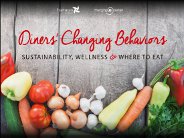| FOR IMMEDIATE RELEASE |
|
Sustainability takes on greater cultural weight, new report finds; diners’ preferences for healthy and sustainable food linked to opportunities for restaurants and food service operators
|
BELLEVUE, WASHINGTON — Consumer-driven demand for higher-quality food and beverage experiences is now diffusing from supermarket aisles into a broader range of restaurant formats and food service settings.Food culture and eating norms are changing dramatically. “Just as people now shop at an array of food retailers seeking new experiences and flavors such as local, organic, natural and fresh distinctions, so too do they look for those experiences while eating out,” said Laurie Demeritt, CEO of The Hartman Group. “Although traditional dining habits persist (for example, in the minds of diners, eating out remains tied to celebration), consumers have outsourced food preparation and now eat out as a daily habit. When that new behavior is paired with our ongoing cultural fascination with global flavors, diet and health, we see greater demand for menus with fresh, healthy and sustainable options.”These changes in food culture occur at the same time that food service operators face new challenges and unprecedented risks as food and beverage supply chains become more brittle due to numerous environmental, social and economic influences. “Just as people now shop at an array of food retailers seeking new experiences and flavors such as local, organic, natural and fresh distinctions, so too do they look for those experiences while eating out,” said Laurie Demeritt, CEO of The Hartman Group. “Although traditional dining habits persist (for example, in the minds of diners, eating out remains tied to celebration), consumers have outsourced food preparation and now eat out as a daily habit. When that new behavior is paired with our ongoing cultural fascination with global flavors, diet and health, we see greater demand for menus with fresh, healthy and sustainable options.”These changes in food culture occur at the same time that food service operators face new challenges and unprecedented risks as food and beverage supply chains become more brittle due to numerous environmental, social and economic influences.
According to a new report, “Diners’ Changing Behaviors: Sustainability, Wellness and Where to Eat” by The Hartman Group and Changing Tastes, dining habits are converging to include a heightened interest in sustainable menu options.
“Today, restaurant and food service companies have to navigate unprecedented changes both in the cost of food and the values of the dining public, which now include their health and the health of the planet,” said Arlin Wasserman, Founding Partner, Changing Tastes. “This report provides key insights into how to successfully bring these together on the menu, in the dining hall and in food service operations.”
More information about the Diners’ Changing Behaviors report can be found by visiting The Hartman Group’s website: www.hartman-group.com About the Report |
Today’s diners prefer healthier, sustainable foods
Posted by nemerson on Mar 25, 2015 in Brain Health Blog, In the News, More, News | 0 comments
